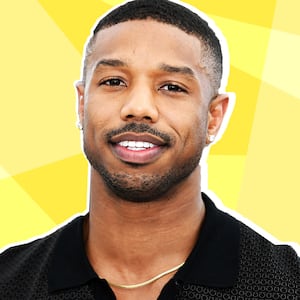The working class grittiness of Rocky has always been far less compelling to me than the pro wrestling-style flamboyance of the series’ third and fourth entries. Thus, it comes as a welcome relief that, after an expert reboot via 2015’s Creed, the franchise now takes a deliberate turn for the more cartoonish with Creed II. A follow-up to both its immediate predecessor and Rocky IV—minus, alas, the latter’s overt Cold War jingoism and “can’t we all get along” sermonizing—Steven Caple Jr.’s sequel isn’t as objectively “good” as Ryan Coogler’s Adonis Creed (Michael B. Jordan) origin story. But its muscular rendition of that familiar against-the-odds Rocky tune is just as entertaining.
Written by Sylvester Stallone (who once again reprises his role as the Italian Stallion) and Juel Taylor, Creed II picks up with Adonis demolishing the heavyweight champion of the world to nab the coveted title. Life at the top doesn’t prove comfortable for long, however, since no sooner is he crowned than a new challenger to the throne emerges: Viktor Drago (Florian Munteanu), son of Ivan (Dolph Lundgren), the steroidal USSR behemoth who killed Adonis’ dad Apollo (Carl Weathers) in the ring during Rocky IV’s “Living in America”-scored exhibition bout.
With the aid of a shady promoter (Russell Hornsby), Viktor travels from the mean streets of Kiev to Philly to call out Adonis, thus igniting a firestorm of sports-media hype and pressuring Adonis into accepting a fight that nobody—including Rocky and Adonis’ singer-songwriter girlfriend Bianca (Tessa Thompson)—thinks he should take.
As far as sequel ideas go, this is pretty cheesy stuff—which is a good thing. Rocky may treat its subject as an authentic bootstraps-pulling palooka, but Rocky III and IV remain his high-water outings precisely because they set aside any pretenses of realism in favor of thrilling action-figure superheroics. In that regard, Creed II doesn’t go as far as those prior efforts, maintaining considerable focus on Adonis’ inner struggle to find something worth fighting for. But it recognizes that there’s only so much profundity to be found in a guy who punches people in the head for a living, and therefore shrewdly humanizes him—here, via a subplot involving the unexpected birth of his baby daughter—while simultaneously giving him a charismatic cast of supporting characters, and, crucially, a formidable adversary with whom he has a very deep, personal beef.
That would be Viktor, who lets his cinder-block physique and furious scowl do the talking for him in Creed II. Alongside Lundgren, Munteanu more than fits the evil-villain bill. More shrewdly still, Caple Jr. doesn’t just demonize the Dragos; rather, he makes them borderline empathetic, depicting them as victims of a Soviet (and post-Soviet) nation that discarded them for Ivan’s 1986 failure against Rocky—a fate epitomized by Ivan’s wife Ludmila (Brigitte Nielsen, in a glorious cameo) walking out on them. Bitterness at this treatment is what drives them, as a grizzled Drago makes plain to Rocky during a superb sit-down chat at the latter’s Philly restaurant. One almost wishes Caple Jr. spent more time on the Dragos, since Ivan’s bad-sports-dad routine with his son—and, moreover, the sense that he’s driving Viktor to right his wrong, even though courting the cretins who shunned them is a fundamentally false dream—is thornier than Adonis’ own dilemmas.
Facing past fears and fury, and embracing family as a preeminent source of strength, are undercurrents coursing throughout Creed II, propelling its formulaic narrative forward. Despite the warnings of those closest to him, Adonis steps into the squared circle against Viktor (sans Rocky in his corner) and pays a mighty price for his hubris. Brought low, he searches for answers and grapples with domestic challenges. Eventually, he understands where he’s gone astray, reconnects with himself and his friends and relatives, and gets back to the nitty-gritty of becoming an unstoppable pugilistic force. Cue Michael Buffer bellowing “Let’s Get Ready to Rumble!” in Russia—where the crowd is against him—and Adonis’ rise-fall-rise trajectory is nearly complete.
That last paragraph might qualify as spoiler-y if not for the fact that Creed II is a by-the-books affair wholly uninterested in surprising its audience. Adonis’ attempt to fashion his own legacy—one that comfortably includes his iconic fallen father, while standing on its own—is preordained to succeed. Yet Caple Jr. nonetheless makes viewers care about his protagonist’s moment-to-moment plight. Though he doesn’t deliver a bravura single-take sports sequence like Coogler did in the original Creed, the director employs POV shots and yo-yoing camerawork to put us right in the thick of the boxing action. He has a flare for striking compositions of solitary figures in distress, and his cross-cutting training montages do the pulse-pounding trick—especially a capper that melds hip-hop and Bill Conti’s Rocky theme to rousing effect.
Creed II indulges in a bit of excessive fan service, and its climactic showdown doesn’t hit quite the high note for which it’s striving, thanks to some rather ho-hum fight scripting in its closing rounds. However, it’s elevated by Jordan’s magnetic performance (and presence—he radiates stardom) and by the reliably crusty turn by Stallone, whose Rocky continues to be a lonely, broken-down man trying his best to be a protective father figure for Adonis. Similar to his protégé, Rocky is looking to correct bygone injustices and atone for regretful mistakes, and after 42 years with the character, Stallone knows just how to underplay him, using a shuffling gait and wounded, downcast eyes to convey his humbled spirit, and also to set up his more inspiring speeches.
Caple Jr. concludes Creed II’s epic showdown with a shot that’s as touchingly elegant as anything found in the series’ two Adonis-focused installments. It’s a graceful final touch for a film that by and large goes about its business with stylish proficiency, manipulating one’s emotions in ways that are as predictable as they are desired. Even if it falls short of being a definitive triumph, it more than knows how to get its job done.






